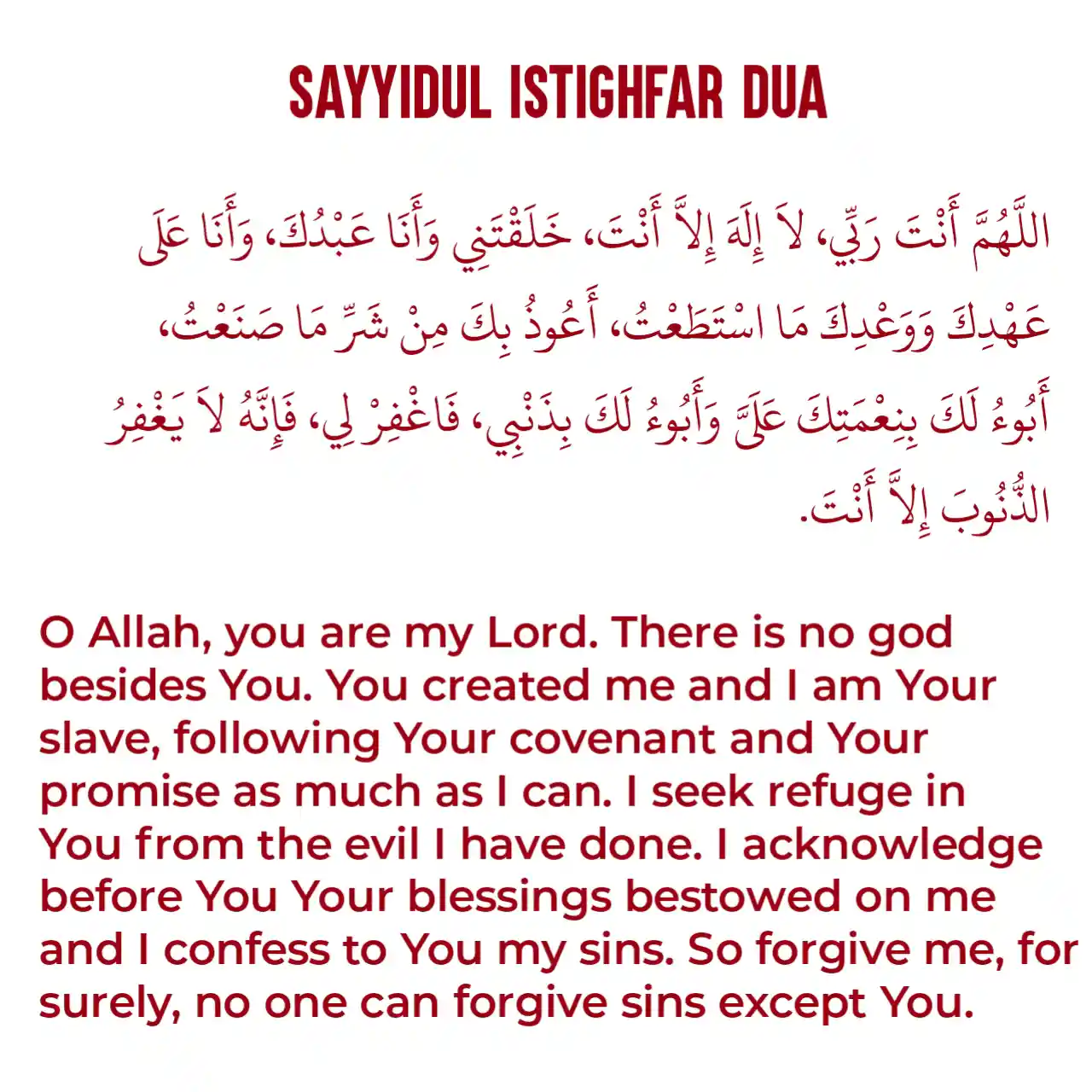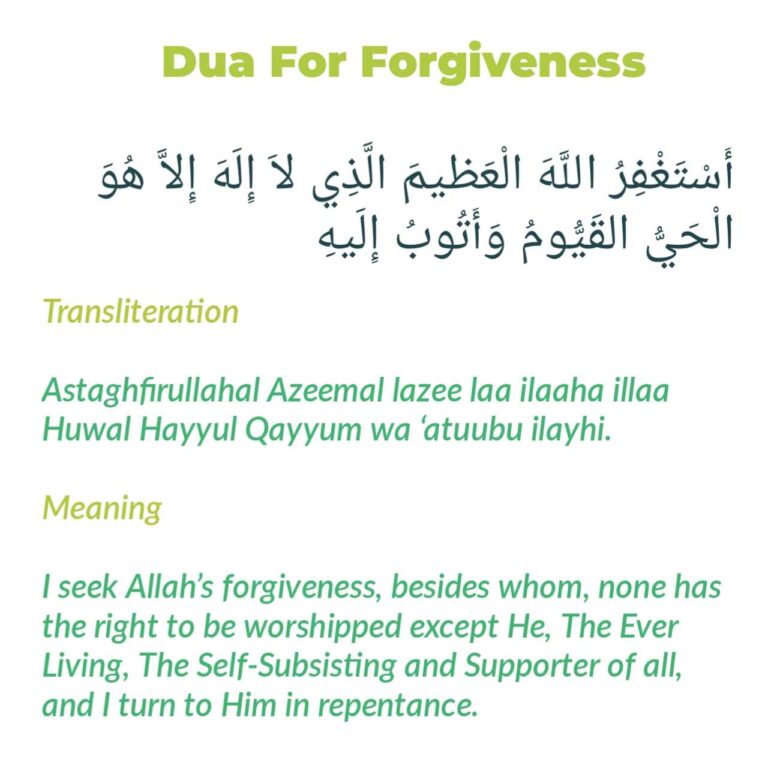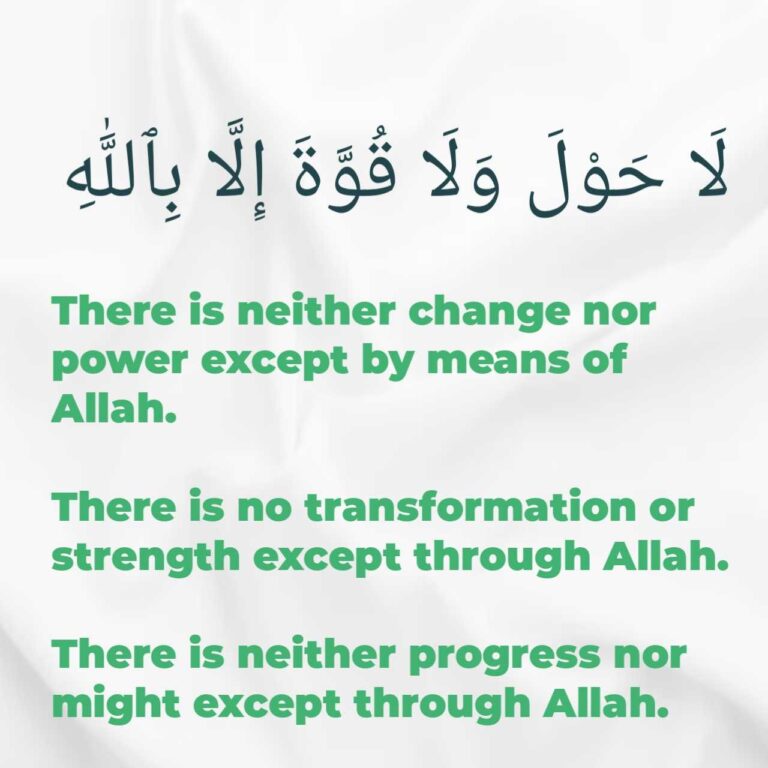Sayyidul Istighfar Dua Arabic, Transliteration, Meaning in English And Hadith
Sayyidul Istighfar Dua is the best supplication for seeking forgiveness. The Prophet SAW said that whoever supplicates with these expressions during the day with firm belief in the supplication and dies on the same day (before the evening) will be among the dwellers of Paradise.
Advertisements
Similarly, the one who supplicates with these expressions in the evening with firm belief in it and dies before the morning will be among the dwellers of Paradise. Let us learn the meaning and importance of this amazing zikr,
Sayyidul Istighfar In Arabic Text
The Arabic text of Sayyidul Istighfar is
اللَّهُمَّ أَنْتَ رَبِّي، لاَ إِلَهَ إِلاَّ أَنْتَ، خَلَقْتَنِي وَأَنَا عَبْدُكَ، وَأَنَا عَلَى عَهْدِكَ وَوَعْدِكَ مَا اسْتَطَعْتُ، أَعُوذُ بِكَ مِنْ شَرِّ مَا صَنَعْتُ، أَبُوءُ لَكَ بِنِعْمَتِكَ عَلَىَّ وَأَبُوءُ لَكَ بِذَنْبِي، فَاغْفِرْ لِي، فَإِنَّهُ لاَ يَغْفِرُ الذُّنُوبَ إِلاَّ أَنْتَ.
Sayyidul Istighfar Dua Transliteration
The transliteration of Sayyidul Istighfar is Allahumma anta Rabbi la ilaha illa anta, Khalaqtani wa ana Abduka, wa anaala ahdika wa wa dika mastatatu, Audhu bika min Sharri ma sanatu, abu’u Laka binimatika `alaiya, wa abu’u laka bidhanbi faghfir lee fa innahu la yaghfiru adhdhunuba illa anta.
Advertisements
Sayyidul Istighfar Meaning In English
Sayyidul Istighfar dua means O Allah, you are my Lord. There is no god besides You. You created me and I am Your slave, following Your covenant and Your promise as much as I can. I seek refuge in You from the evil I have done. I acknowledge before You Your blessings bestowed on me and I confess to You my sins. So forgive me, for surely, no one can forgive sins except You.
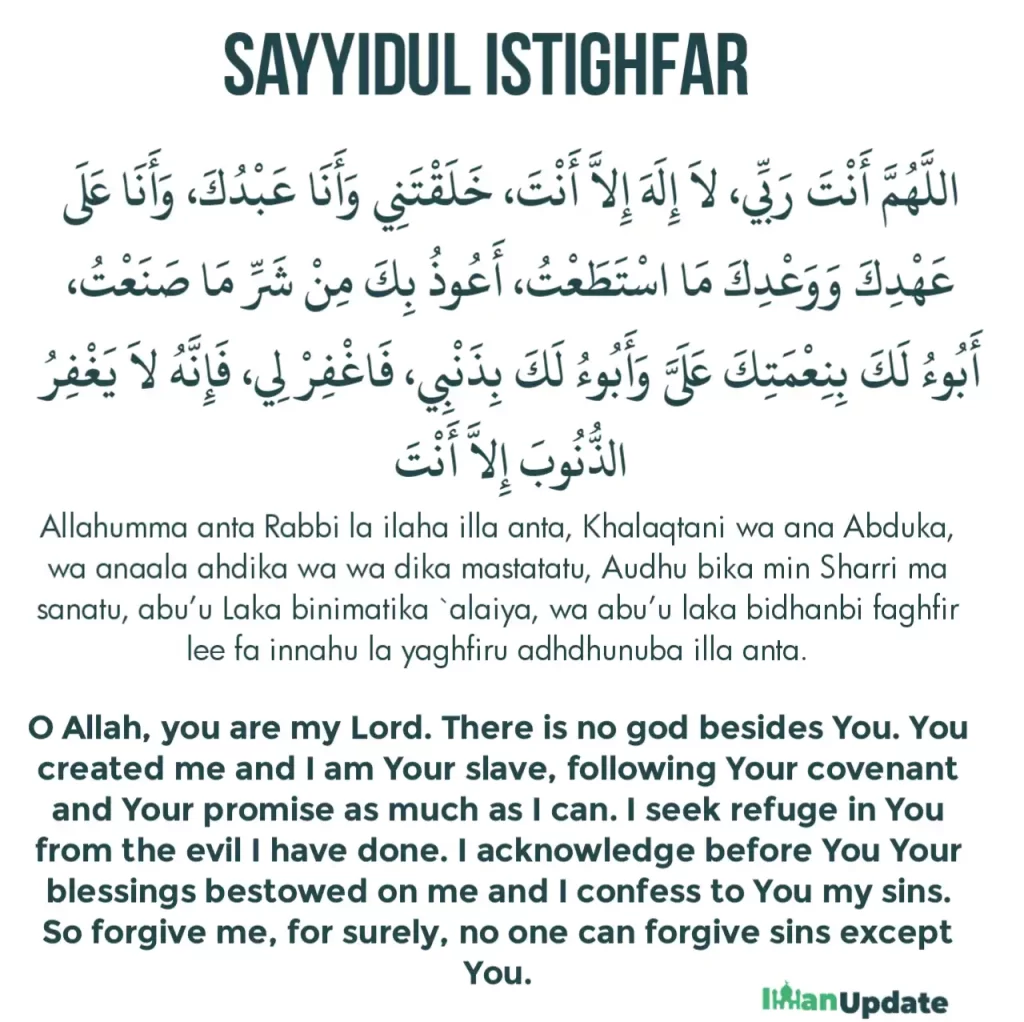
Sayyidul Istighfar Hadith
In Sahih al-Bukhari, Hadith number 6306, narrated Shaddad bin Aus:
The Prophet (ﷺ) said “The most superior way of asking for forgiveness from Allah is: ‘Allahumma anta Rabbi la ilaha illa anta, Khalaqtani wa ana Abduka, wa ana ala ahdika wa wadika mastatatu, Audhu bika min Sharri ma sanatu, abu’u Laka bini matika `alaiya, wa abu’u laka bidhanbi faghfir lee fa innahu la yaghfiru adhdhunuba illa anta.”
The Prophet (ﷺ) added. “If somebody recites it during the day with firm faith in it, and dies on the same day before the evening, he will be from the people of Paradise; and if somebody recites it at night with firm faith in it, and dies before the morning, he will be from the people of Paradise.”
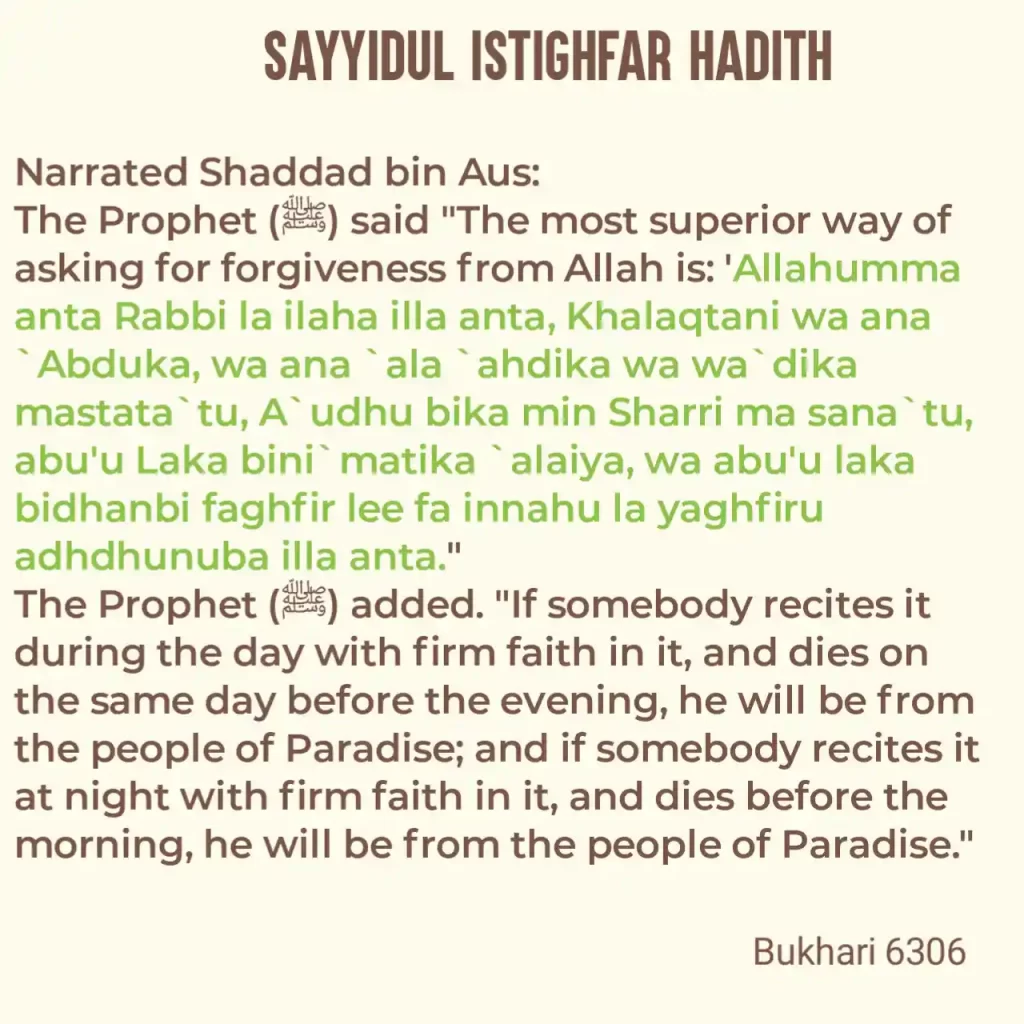
Sayyidul Istighfar Benefits
The Prophet SAW said the best supplication for seeking forgiveness is to say:
Advertisements
‘O Allah, You are my Lord; there is none worthy of worship except You. You created me and I am your servant.’
You acknowledge to Allah with your tongue and heart that He is your Lord, your King, the Controller of your affairs and the Knower of your situation.
You are His servant in His Universal and Legislative acts. As for your servitude to His Universal acts, He does whatever He wishes with you.
Advertisements
If He wills, He causes you to fall sick or grants you good health. If He wills, He grants you wealth or makes you poor. If He wills, He guides you or leads you astray based on His Wisdom.
Similarly, you are the servant of His by Legislative acts. You have to worship Him the way He has commanded you. You should carry out His obligations and stay away from His prohibitions.
Confess to Him that: “O Allah, You are my Lord. There is no god beside You. You created me and I am Your slave, following Your covenant and Your promise as much as I can.’
You should acknowledge that Allah is the One who created you when He brought you out of nothing. You should follow His covenant and promise to the best of your ability.
This is because everyone took covenant from Allah to do what he has been taught:
“When Allah took covenant from those who were given the scriptures to make it known and clear to mankind and not to hide it.”
Surah Al Imran 187
Whenever Allah blesses you with knowledge, it is indeed a covenant you have taken from Him that you will apply it.
“I follow your promise” means I believe in your promise. That is, the good you have promised the good-doers and the evil you have promised the evildoers.
But I follow Your promise, that is in goodness. Indeed, you are seeking nearness to Allah – the Mighty and Sublime- with these words.
“I seek refuge in you from the evil I have done.” That is, you are seeking refuge with Allah from the evil you have committed because a person is rewarded for his good deeds and punished for his evil deeds.
The evil he did may be a cause of going astray as stated by Allah – the Mighty and Sublime:
“And if they turn away, then know that Allah is will to punish them for some sins of theirs!’
Surah Ma’idah 47
Therefore, you should seek refuge with Allah from the evil of what you have done.
Then, “I acknowledge before You Your blessings bestowed on me.” That is, I admit and acknowledge your great favours which are innumerable!
“I confess my sins to You,” that is, I admit them. “So forgive me this sin for surely no one can forgive sin except you.”
You should endeavour to memorize this supplication, and adhere to it in the morning and in the evening.
If you die during the day you will be among the dwellers of Paradise; and if you die during the night you will be among the dwellers of Paradise.
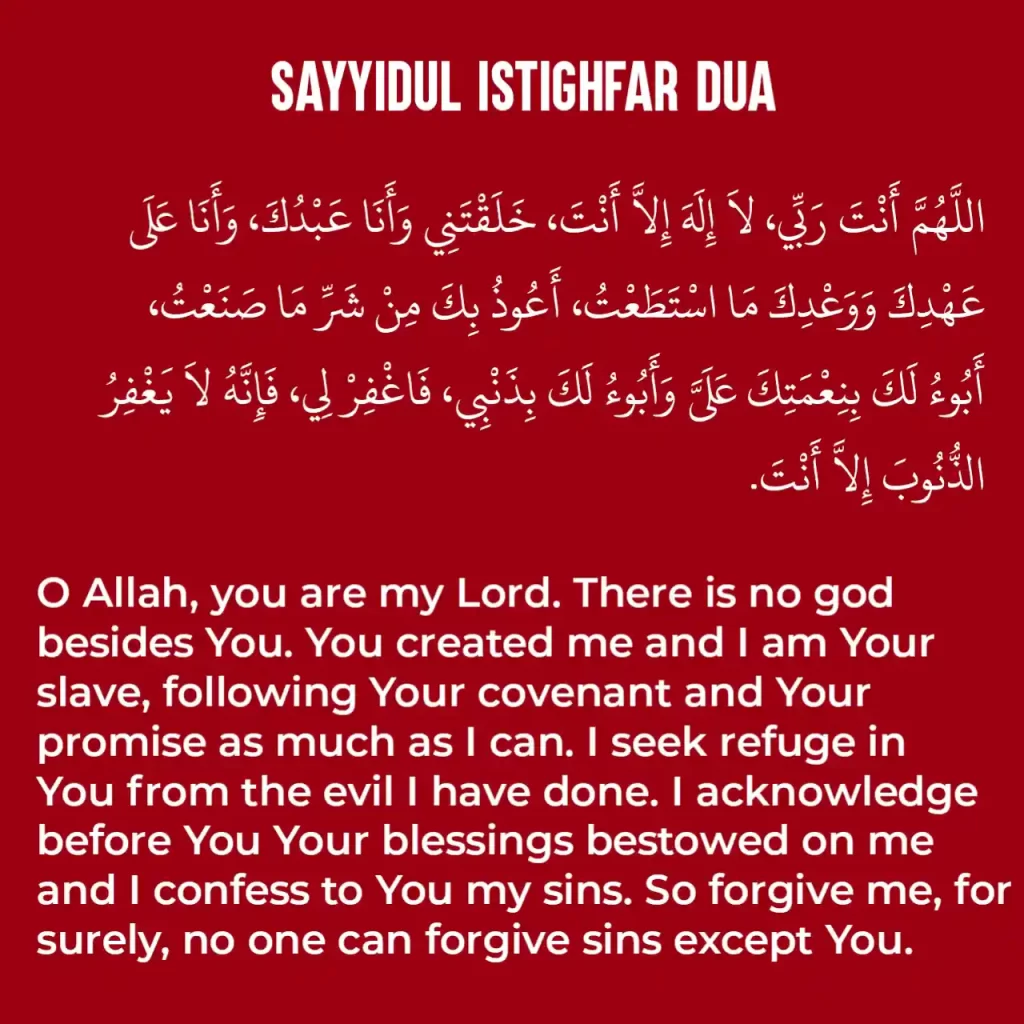
Commentary
The Prophet (SallaAllahu ‘alayhi wasallam) referred to this supplication as “the master of seeking forgiveness”, and he said that whoever says it with certainty in the morning or evening and dies during that morning or evening, he will enter Paradise.
We begin the supplication by acknowledging Allah as our Lord i.e. acknowledging His authority over us as well as His blessings and bounties upon us.
As Allah is our Lord, we need to interact with Him in an appropriate manner, therefore we worship Him alone, and affirm this in this supplication by saying that there is none worthy of worship but Him.
To further reiterate Allah’s Lordship over us, we remind ourselves that He is the one who created us, so we are His slaves and must worship Him as He commands.
After acknowledging Allah’s superiority over us, we move on to how we are supposed to interact with Him, which is that we try and fulfil our pledge to Him.
Our pledge to Allah is the pledge we made when we were taken out from the back of Adam (alayhi assalam) as Allah mentions in the Qur’an,
And when your Lord took out the offspring from the loins of the Children of Adam and made them bear witness about themselves, He said, ‘Am I not your Lord?’ and they replied, ‘Yes, we bear witness.’
Al-Qur’an, Surah Al-A’raf 172
Allah’s covenant to us is the one mentioned in the hadith narrated by Muadh ibn Jabal, in that Allah will not punish the one who does not associate any partners with Him.
By highlighting that we will keep our pledge so long as we are able, we acknowledge our weakness and shortcomings towards Allah, as we will never be able to worship Him and thank Him as He truly deserves.
We seek refuge in Allah from the evil of our actions as they could lead us to be punished or to fall deeper into misguidance, and prevent us from doing more good.
By acknowleging Allah’s blessings over us, we feel more shame to disobey Him, so we admit our sins as a way of asking for repentance in that we acknowledge our mistakes and want to rectify them.
All of what was mentioned so far in this supplication is just a preparation for the last part, which is to ask Allah for forgiveness
Action Points
Though this supplication is to ask Allah for forgiveness, we only do so at the end, so we learn that the best way of seeking forgiveness is not to immediately ask for it, but prepare yourself mentally by humbling yourself before Allah and strengthening your desire to be forgiven.
This supplication teaches us how to repent, which is to admit your mistake, intend never to return to it, and ask Allah to forgive it.
This hadith teaches us the best way of seeking forgiveness, which should include:
- Acknowledging Allah’s greatness and that He deserves to be worshipped.
- Acknowledging the pledge we made to Allah, which is to take Him as our Lord.
- Hoping for the promise of Allah of allowing us to enter Paradise if we do not associate partners with Him.
- Seeking refuge in Allah from the evil of our sins.
- Acknowledging Allah’s blessings over us.
- Acknowledging our shortcomings towards Allah in terms of sins and not perfecting acts of worship.
- Verbally asking for forgiveness after we have humbled ourselves before Allah and realised our great need for Him and shortcomings towards His rights.
It is no surprise that the prophet (SallaAllahu ‘alayhi wasallam) said that whoever says this with certainty will enter Paradise, as whoever says it with certainty is someone who sincerely repents to Allah and Allah will accept the repentance of the sincere person and forgive his sins, therefore this person will enter Paradise!
Advertisements

